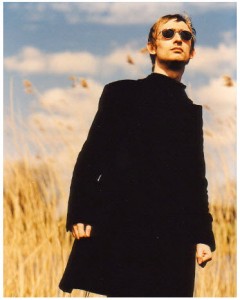
Neil Hannon Has Always Been The Heart & Soul Of The Divine Comedy
The Divine Comedy has the unfortunate distinction of being discussed as a band whose musical greatness is only matched by how abysmally it has been marketed from the very beginning. Listening to their albums is as enthralling as it is frustrating – the mere thought of music so articulate and witty being confined to a selected public is unfulfilling, in the same way that it gives you the aggrandizing feeling that comes from having discovered something that is clearly a cut above the rest, and that hasn’t been vitiated by being exposed to the most ordinate cognition.
Speaking with property, when we talk about The Divine Comedy we are talking about a single man that has been accompanied by a revolving set of musicians. This man is Neil Hannon, an Irish-born performer that possesses a phenomenal bag of pipes and a stage presence that equals the elegance and verve of his compositions. I personally find him the closest to a modern-day Oscar Wilde in his dandyism and mercurial wit.
The Divine Comedy has released 11 albums during its career. Although the band did never have a bonafide hit, there was some serious chart activity at the time they released their fourth album. “Casanova” (1996). They were able to piggyback on the furor caused by British bands like Oasis and Blur and land a Top 20 single in the shape of “Something For The Weekend”. And the song “Becoming More Like Alfie” (culled from the same disc) did also hit the Top 30.
Subsequently, the song “National Express” (from the album “Fin de Siecle”, issued in 1998) received a lot of airplay, and a “Best Of” package was released as the first incarnation of the band fell apart. But Hannon was back onstage with a new version of The Divine Comedy within months, and some of his most stunning music surfaced in the album “Absent Friends”, where the chamber pop that had always characterized the band reached a true level of magnificence that became all too apparent on the contemporary “Live At The Palladium” DVD. That DVD included an extensive performance of the “Absent Friends” compositions (the title track was used to open the set, and songs like “Our Mutual Friend” became masterpieces of dramatism) along with inspired readings of favorites like “Songs Of Love” and “Tonight We Fly”.
Hannon recently created his own record company (which goes by the apt name of DC Records) and he has just released a new album entitled “Bang Goes The Knighthood”. He is also set to rerelease all the “classic” Divine Comedy records through it, having won the rights from the previous label (Setanta Records).
I have always been greatly attached to Hannon’s music and his never-ending array of allusions. Right from his interpretation of Wordsworth’s “Lucy” poems on the “Liberation” album (the true birth of the band) to songs like “Absent Friends” (that present a parade of characters and their circumstances much like modernist poets like Ruben Darío or Julio Herrera y Reissig used to do), Hannon has been able to create a world in which all strands of art become continents accessible using music as the vehicle that transports the listener from one location to the other. So, my friends, fasten your seatbelts. Tonight we fly…
